
The Summer and Winter Comparison
How did the winning all season tyre (Goodyear Vector 4Seasons) compare against it's summer and winter rivals? In snow braking, the Goodyear stopped the car in 17.9 meters from 40 km/h, where the winter managed 16.5 meters. This seems like quite a gap, until you consider the summer tyre took nearly double the distance, at 33.3 meters. It was a similar story in the other snow tests, with the Goodyear just a shade behind the dedicated winter, and the summer tyre next to useless.In the wet, both the winter and Goodyear all season performed better in the aquaplaning results than the dedicated summer, it wasn't until wet braking the summer started to show its advantage, stopping in 56.1 meters, compared to 58.6 meters for the Goodyear and 60.7 meters for the winter from 100 km/h.
In the dry, the summers advantage was further stretched, stopping in just 39.6 meters from 100 km/h, where the Goodyear took 45.3 meters and the winter 48.6.
Both the Goodyear and the summer tyre had nearly identical rolling resistance scores, and very similar drive by noise scores.
Other All Seasons
While we focused on the test winning Goodyear Vector 4Seasons for the above, there's another all season tyre which might be better suited to the UK climate. The Bridgestone A001 had a comparatively poor snow braking performance, stopping the car in 19.6 meters (still 13.7 meters before the summer tyre!), but actually managed to beat the summer tyre in wet braking, and was a meter closer to the summer in the dry.Does the all season really work best for all seasons?
Every tyre is a compromise of its intended abilities, and an all season tyre has an extra compromise to make over a dedicated summer or winter.If you can only run one tyre year round, an all season tyres offers the best overall braking performance for the year, however the optimum and safest way to cover 12 months motoring is still with a dedicated summer and winter tyre.
Results
1st: Goodyear Vector 4Seasons | |
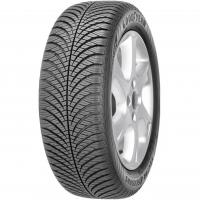
| The model all-season tyre. Balanced safe driving characteristics on snowy slopes. Short wet braking distances and high aquaplaning safety-reserves. Pleasantly quiet, exemplary ride comfort and low rolling resistance Read Reviews |
2nd: Sava Adapto | |
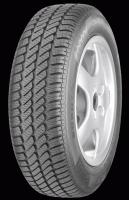
| Multitalented tyre. Precise steering and stable running in all weather conditions. Dynamic sporty handling with short braking distances on wet roads and exemplary low fuel consumption Read Reviews |
3rd: Hankook Optimo 4S | |
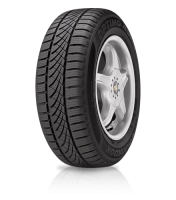
| A good all round tyre with precise steering and stable handling properties on dry slopes; short wet and dry braking distances, low rolling resistance Tendency to understeer Read Reviews |
4th: Kumho Solus 4 All Weather | |

| Good all-season tyres, with balanced handling on snowy and dry roads, short snow braking distances and a low pass-by noise Only satisfactory handling Read Reviews |
5th: Vredestein Quatrac Lite | |
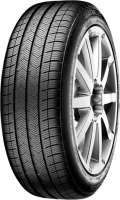
| Safe handling qualities with stable turning and good feedback on a wet track, short dry braking distances and lowest rolling resistance in the test Average on snow, poor aquaplaning result Read Reviews |
6th: Bridgestone A001 | |
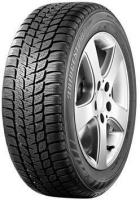
| The rain professional with a dynamic sporty handling - excellent driving qualities on both wet and dry conditions, best safety reserves to aquaplaning, shortest braking distances in the wet Average snow performance Read Reviews |
7th: Kleber Quadraxer | |
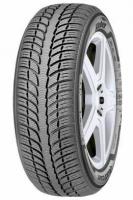
| Balanced safe driving characteristics and short braking distances on snowy slopes, pleasant ride comfort Poor steering behavior and extended braking distances in wet and dry conditions Read Reviews |
8th: Star Performer Winter AS | |
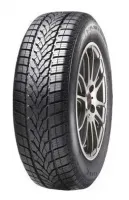
| Good traction and short braking distances on snow-covered slopes, safe wet handling qualities, quiet noise level Average safety reserves to aquaplaning, long wet and dry braking distances, delayed steering response Read Reviews |
9th: Tyfoon Tyfoon All Season | |
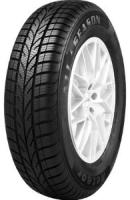
| Winter tire with a low rolling resistance and rolling noise Very bad in the wet Read Reviews |
10th: Herse Herse 4Season | |

| Acceptable in the dry Poor wet performance and dangerous in the snow. High rolling resistance Read Reviews |







